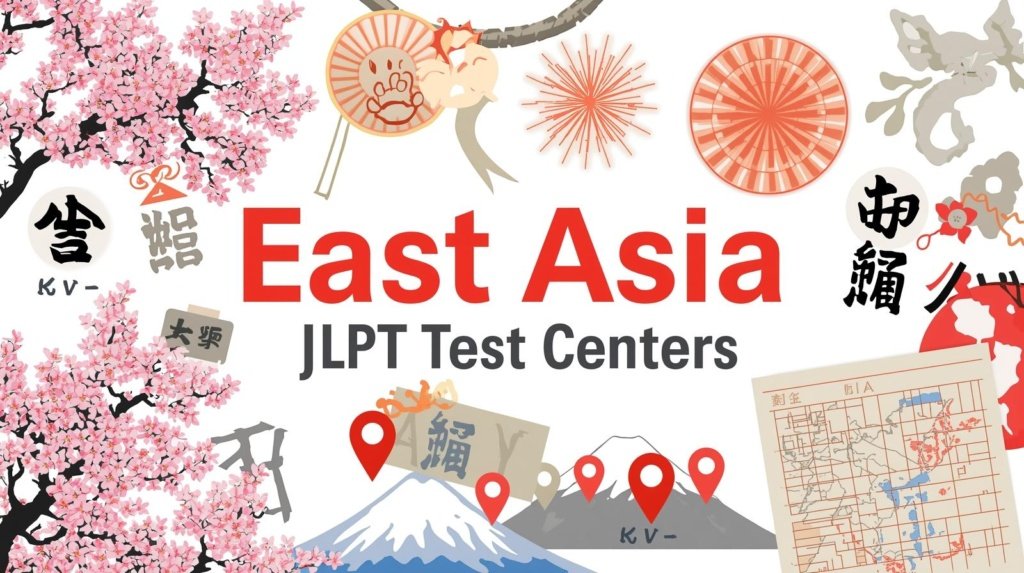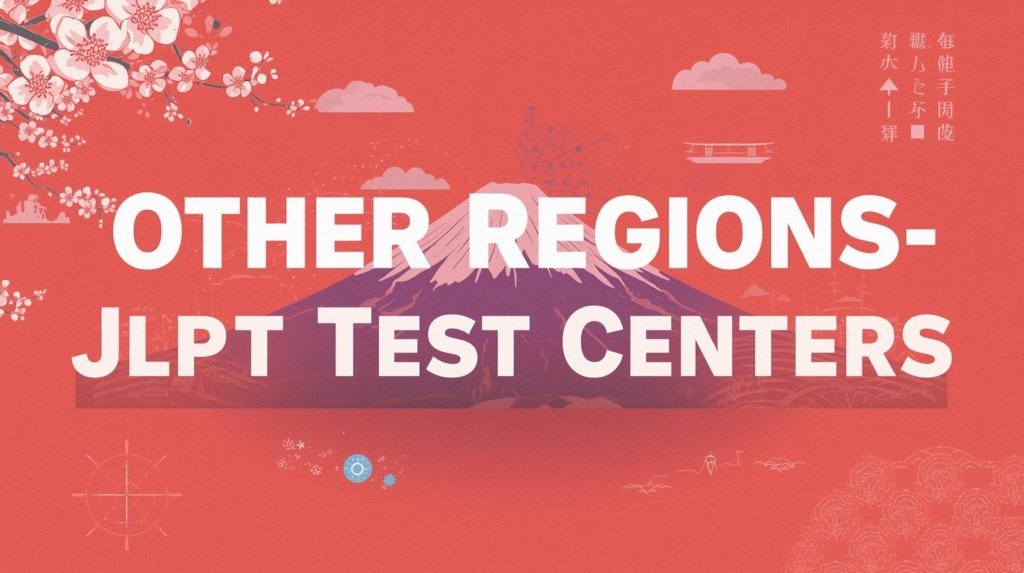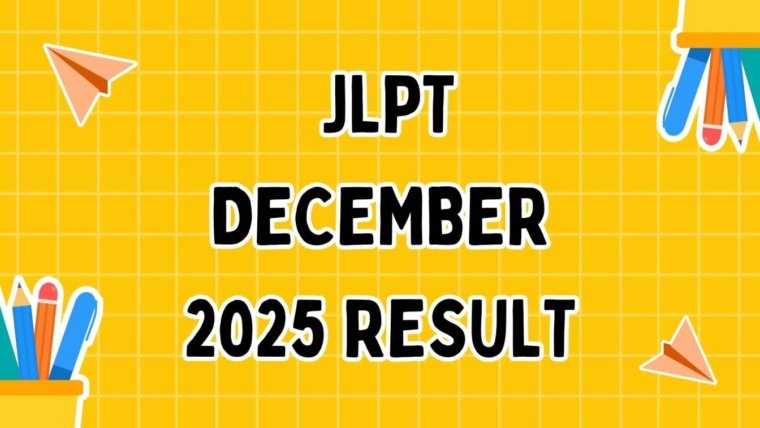Overseas Test Centers JLPT If you are preparing for JLPT 2025, understanding the Overseas Test Centers for JLPT, local host institutions, and exam schedule is essential for a smooth and stress-free registration process. The Japanese Language Proficiency Test (JLPT) is one of the most widely recognized language certifications for non-native speakers, measuring skills in reading, listening, grammar, and vocabulary.
Planning to take the JLPT outside India? Explore the official Overseas Test Centers for JLPT with local host institutions worldwide. JLPT Overseas Test Site Cities and Local Host Institutions
The JLPT is conducted twice a year, usually in July and December, across multiple countries and cities. Each test location is managed by a local host institution, such as a Japanese cultural center, university, or language school, ensuring the exam follows official guidelines. Knowing the nearest test center, registration deadlines, and seat availability can help you plan your preparation and avoid last-minute hassles. Sample Questions for JLPT N5
In this guide, we provide a complete list of Overseas Test Centers for JLPT 2025, highlight local host institutions in India, and share useful tips to make your exam registration and planning more effective. Whether you are a beginner aiming for N5 or an advanced learner targeting N1, this guide will help you navigate the JLPT 2025 process with confidence.
For a complete list of JLPT centers in India, check out JLPT Exam Centers in India.
East Asia – JLPT Test Centers
East Asia hosts the JLPT in several major cities, with local universities and Japanese cultural centers serving as official test venues. These institutions ensure the exam follows standardized guidelines, providing a structured and reliable environment for candidates to take the JLPT, available in July and December each year. JLPT Exam Centers in India.

| City | Local Host Institution | Test Months |
| Beijing, China | Beijing Japanese Cultural Center | July, December |
| Shanghai, China | Shanghai International Studies University | July, December |
| Seoul, South Korea | Korean-Japanese Cultural Center | July, December |
| Taipei, Taiwan | National Taiwan Normal University | July, December |
| Hong Kong | Hong Kong Japanese Language Education Center | July, December |
Southeast Asia – JLPT Test Centers
Southeast Asia offers numerous Overseas Test Centers for JLPT, primarily in capital cities. Local universities and Japanese cultural centers host the exams, ensuring standardized administration, with tests conducted twice a year, typically in July and December. Common Mistakes to Avoid in JLPT Preparation
| City | Local Host Institution | Test Months |
| Bangkok, Thailand | Chulalongkorn University | July, December |
| Jakarta, Indonesia | Japan Foundation Jakarta | July, December |
| Kuala Lumpur, Malaysia | Japan Foundation Kuala Lumpur | July, December |
| Manila, Philippines | Ateneo de Manila University | July, December |
| Hanoi, Vietnam | Hanoi University | July, December |
South Asia – JLPT Test Centers
In South Asia, India offers JLPT exams in key cities like New Delhi, Mumbai, Chennai, Kolkata, and Bangalore. These exams are conducted twice a year, in July and December, at official venues managed by Japanese cultural centers and universities. Each center ensures standardized testing following official JLPT guidelines, providing a reliable environment for candidates at all levels, from N5 beginners to N1 advanced learners.
| City | Local Host Institution | Test Months |
| New Delhi, India | Japan Foundation New Delhi | July, December |
| Mumbai, India | Mumbai University | July, December |
| Chennai, India | Japan Foundation Chennai | July, December |
| Kolkata, India | Jadavpur University | July, December |
| Bangalore, India | Japanese Cultural Center, Bangalore | July, December |
Other Regions – JLPT Test Centers
In other regions, JLPT test centers are spread across Oceania, Europe, the Middle East, and Africa. Official host institutions, including universities and Japanese cultural centers, manage these centers to ensure exams are conducted according to standardized guidelines. Candidates can take the JLPT twice a year, typically in July and December, at these locations. These centers provide a reliable and structured testing environment for all proficiency levels, from beginners (N5) to advanced learners (N1), helping candidates prepare and perform effectively.

Oceania
In Oceania, JLPT exams are conducted in cities like Sydney, Melbourne, and Auckland. Universities such as the University of Sydney, Monash University, and the University of Auckland serve as official host institutions. Tests are held twice a year, in July and December, providing standardized exam environments for all proficiency levels.
| City | Local Host Institution | Test Months |
| Sydney, Australia | University of Sydney | July, December |
| Melbourne, Australia | Monash University | July, December |
| Auckland, New Zealand | University of Auckland | July, December |
North America
In North America, JLPT exams are held in major cities including New York, Los Angeles, Chicago, Toronto, and Vancouver. These exams are conducted twice a year, in July and December, providing candidates with regular opportunities to take the test. Official host institutions, such as universities and Japanese cultural centers, manage the exam venues to ensure a standardized and reliable testing environment. Each center follows strict JLPT guidelines, catering to all proficiency levels from N5 beginners to N1 advanced learners. This structured setup helps candidates prepare effectively and take the exam with confidence.
| City | Local Host Institution | Test Months |
| New York, USA | Japan Society New York | July, December |
| Los Angeles, USA | UCLA Extension | July, December |
| Toronto, Canada | University of Toronto | July, December |
| Vancouver, Canada | Vancouver Japanese Language School | July, December |
Latin America
In Latin America, JLPT exams take place in key cities such as São Paulo, Buenos Aires, and Mexico City. These exams are conducted twice a year, typically in July and December, offering candidates consistent opportunities to participate. Official host institutions, including local Japanese cultural centers and universities, manage the exam venues to ensure standardized testing conditions. Each center follows strict JLPT guidelines, creating a reliable and structured environment for all proficiency levels, from beginners at N5 to advanced learners at N1. This organization allows candidates to prepare thoroughly and approach the exam with confidence and clarity.
| City | Local Host Institution | Test Months |
| São Paulo, Brazil | São Paulo Japanese Cultural Center | July, December |
| Buenos Aires, Argentina | University of Buenos Aires | July, December |
| Mexico City, Mexico | Universidad Nacional Autónoma de México | July, December |
Europe
In Western and Eastern Europe, JLPT exams are organized in major cities including London, Paris, Berlin, Rome, Moscow, Warsaw, and Prague. These exams are conducted twice a year, usually in July and December, giving candidates regular opportunities to take the test. Official host institutions, such as Japanese cultural centers and universities, manage the exam venues to ensure standardized testing conditions. Each center strictly follows JLPT guidelines, providing a reliable and structured environment suitable for all proficiency levels, from beginner N5 to advanced N1. Candidates benefit from well-organized exam settings that help reduce stress and improve focus. With clear schedules and trusted host institutions, learners can plan their preparation effectively and attempt the JLPT exams with confidence across Europe.
| City | Local Host Institution | Test Months |
| London, UK | Japan Foundation London | July, December |
| Paris, France | Japan Foundation Paris | July, December |
| Berlin, Germany | Japanisches Kulturinstitut Berlin | July, December |
| Rome, Italy | Istituto Giapponese di Cultura | July, December |
| Moscow, Russia | Russian-Japanese Center | July, December |
| Warsaw, Poland | Warsaw University | July, December |
| Prague, Czech Republic | Charles University | July, December |
Middle East & Africa
In the Middle East and Africa, JLPT exams are held in prominent cities including Dubai, Riyadh, Tehran, Cairo, Casablanca, Nairobi, and Johannesburg. These exams are conducted twice a year, typically in July and December, providing learners with regular opportunities to test their Japanese language skills. Official host institutions, such as Japanese cultural centers and universities, manage these exam venues, ensuring that all tests are conducted according to standardized JLPT guidelines. Each center offers a structured and reliable environment suitable for candidates of all proficiency levels, from beginner N5 to advanced N1. By following strict exam protocols and providing consistent testing conditions, these centers help reduce candidate stress and promote fair assessment. Learners can plan their preparation effectively, gain confidence, and approach the JLPT exams in these regions with ease.
| City | Local Host Institution | Test Months |
| Dubai, UAE | Japan Cultural Center Dubai | July, December |
| Riyadh, Saudi Arabia | King Saud University | July, December |
| Tehran, Iran | University of Tehran | July, December |
| Cairo, Egypt | Cairo Japanese Cultural Center | July, December |
| Casablanca, Morocco | Japanese Cultural Center Casablanca | July, December |
| Nairobi, Kenya | University of Nairobi | July, December |
| Johannesburg, South Africa | Japanese Cultural Institute South Africa | July, December |
Tips for JLPT 2025 Registration
Registering for JLPT 2025 requires careful planning to ensure a smooth and successful experience. First, identify and confirm your local host institution, such as a Japanese cultural center, university, or language school, which officially manages the exam in your city. Next, check the exact test dates for your chosen level and location, keeping in mind that the JLPT is conducted twice a year, typically in July and December. Early registration is crucial, as popular centers often fill up quickly, especially for beginner levels like N5 and advanced levels like N1. To prepare effectively, enroll in structured courses offered by institutes such as TLS – The Japanese Language School, which provide guidance, practice tests, and exam-oriented strategies. Additionally, gather all required documents, including a valid ID or passport, recent photographs, and any center-specific forms. Familiarize yourself with the exam format, including reading, listening, grammar, and vocabulary sections, to approach the test confidently and maximize your performance. JLPT exam pattern and format
- Confirm the host institution: Always check the official JLPT website or local host for updated details.
- Test months: JLPT is conducted twice a year – July and December – in most countries.
- Apply early: Popular centers like New Delhi, Tokyo, or Seoul fill up quickly.
- Preparation resources: Enroll in institutes like TLS – The Japanese Language School, offering N5 to N1 coaching online and offline.
- Learn the exam format: Familiarize yourself with listening, reading, and grammar question patterns.
Frequently Asked Questions (FAQs) – JLPT 2025
1. What is the JLPT?
The Japanese Language Proficiency Test (JLPT) is one of the most recognized and respected language examinations for non-native speakers worldwide. It evaluates a candidate’s ability to understand and use the Japanese language in practical contexts, making it a key benchmark for academic, professional, and personal advancement. The JLPT is structured into five levels: N5, N4, N3, N2, and N1. N5 represents the beginner level, focusing on basic grammar, simple vocabulary, and everyday conversation skills, while N1 is the most advanced, testing a candidate’s ability to comprehend complex texts, nuanced grammar, and sophisticated vocabulary across reading and listening sections. Each level of the JLPT assesses different aspects of Japanese language proficiency, including reading comprehension, listening ability, grammar understanding, and vocabulary usage. The exam uses multiple-choice questions, reading passages, and listening exercises to measure practical language skills that learners can apply in real-life situations.
JLPT certification holds significant value for students, professionals, and anyone planning to study, work, or live in Japan. Universities often require specific JLPT levels for admission into Japanese-taught programs, while employers in Japan or Japanese companies abroad may prefer candidates with certified language skills, especially at N2 or N1 levels. Additionally, certain visa categories and professional opportunities in Japan may mandate JLPT certification as proof of language competence. By obtaining JLPT certification, learners not only validate their Japanese proficiency but also enhance career prospects, academic opportunities, and personal confidence in navigating Japanese language environments. The exam serves as both a goal and a structured pathway for systematic learning and improvement in Japanese.
2. When is JLPT 2025 conducted?
The Japanese Language Proficiency Test (JLPT) 2025 will be conducted in two sessions: one in July and another in December. These biannual sessions provide learners with consistent opportunities to assess and certify their Japanese language proficiency. However, the exact exam dates may vary depending on the city and the specific test center, as each center follows its own schedule within the official framework. Therefore, it is crucial for candidates to verify the precise dates with their local host institution or refer to the official JLPT website to ensure accurate information and avoid missing deadlines.
JLPT test centers often experience high demand, particularly in major cities, as learners from various proficiency levels—from beginners aiming for N5 to advanced candidates targeting N1—register for the exams. Popular centers, such as those in New Delhi, Tokyo, or Seoul, can fill up quickly due to limited seating and the growing number of aspirants worldwide. As a result, early registration is highly recommended to secure a seat and guarantee participation in the preferred test session.
Proper planning also allows candidates to organize their preparation effectively, including enrolling in coaching programs, gathering necessary documents, and familiarizing themselves with the exam format. By confirming dates and registering early, learners can approach the JLPT 2025 with confidence, ensuring a smooth exam experience and maximizing their chances of achieving the desired level of certification.
3. Where can I take JLPT in India?
In India, JLPT 2025 test centers are available in major cities such as New Delhi, Mumbai, Chennai, Kolkata, and Bangalore. Each center is managed by a Japanese cultural center, university, or language school to ensure the exam is conducted according to official guidelines. Some centers also offer orientation sessions or practice classes to help beginners prepare effectively for the exam.
4. How do I register for JLPT 2025?
You can register for JLPT 2025 online through the official JLPT website or via the portal of the local host institution in your city. During registration, you need to select your preferred test level, city, and test date. Make sure to complete your registration early, as seats are allocated on a first-come, first-served basis and can fill up quickly at popular centers.
5. What is the fee for JLPT in India?
The registration fee for JLPT in India typically ranges from INR 2,000 to 3,500, depending on the level of the exam. Beginner levels such as N5 and N4 are generally less expensive, while advanced levels like N2 and N1 cost more. Some centers may also charge additional fees for late registration or special facilities.
6. How long is the JLPT exam?
The exam duration varies depending on the level:
- N5 & N4: Approximately 105 minutes, focusing on basic grammar, vocabulary, and listening comprehension.
- N3 & N2: Around 140–155 minutes, testing intermediate reading, listening, and comprehension skills.
- N1: About 170 minutes, assessing advanced grammar, reading comprehension, and listening skills.
Each level includes multiple-choice questions and listening sections designed to measure practical language ability.
7. How can I prepare for JLPT N5 and N4?
To prepare effectively for N5 and N4, beginners should focus on learning basic Japanese phrases, daily conversation skills, simple grammar rules, and essential vocabulary and kanji characters. Practicing reading and listening comprehension regularly is also crucial. Institutes like TLS – The Japanese Language School provide structured lessons, practice tests, and expert guidance, helping learners build confidence and improve their chances of success.
8. Can I take JLPT online?
Currently, the JLPT is only available in-person at designated test centers. There is no option to take the exam online or remotely. However, many language schools, including TLS, offer online preparatory courses that simulate the JLPT testing environment, allowing learners to practice effectively before the actual exam.
9. What documents are needed for registration?
During registration, candidates typically need a valid passport or government-issued ID, recent passport-sized photographs, and any additional documents requested by the test center. It is essential that all documents are up-to-date and match your registration information to avoid any issues on exam day.
10. When will JLPT results be announced?
JLPT results are generally released about two months after the exam date. Candidates can check their scores online using their registration number and personal details. Some institutes also provide guidance on interpreting the results and planning the next level of study.
11. How often should I take JLPT exams?
Most learners take the JLPT once or twice a year, depending on their study schedule and career goals. It is common to start with N5, progress to N4 and N3, and eventually attempt N2 or N1 for advanced certification. Regular attempts help build confidence and track improvement over time.
12. Is JLPT necessary for working in Japan?
Yes, JLPT certification is often required by Japanese companies, especially for roles in IT, translation, education, and business. Student visas may require N5 or N4 proficiency, while professional employment typically requires N2 or N1 certification. Holding a JLPT qualification demonstrates language proficiency and enhances career prospects in Japan.
Contact TLS – The Japanese Language School
For guidance and JLPT preparation, contact TLS – The Japanese Language School. Visit the center at 2/81-82, 2nd Floor, Lalita Park, Gali No – 2, Laxmi Nagar, New Delhi – 110092, call 8700956038, or email tls@teamlanguages.com.Visit Us: 2/81-82, 2nd Floor, Lalita Park, Gali No – 2, Laxmi Nagar, New Delhi – 110092
Call Us: 8700956038
Email Us: tls@teamlanguages.com



